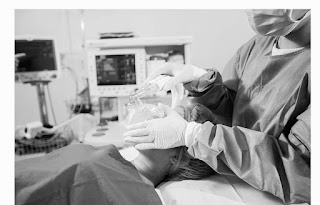Indications and Contraindications for Transesophageal Echocardiography (TEE)
Transesophageal Echocardiography (TEE) is often performed by a cardiac anesthesiologist to evaluate, diagnose, and treat patients in the perioperative period. TEE is very useful during many cardiac surgical procedures (e.g., mitral valve repair, off-pump and on-pump CABG). It helps to detect and quantify the disease preoperatively as well as to assess the results of surgery immediately after the procedure.
If the repair is found to be inadequate,
showing significant residual regurgitation, the surgeon can decide whether to go back to CPB to try to correct the defect. Aortic dissections are another important condition where TEE is very helpful. TEE can also help the surgeon during the insertion of a catheter for retrograde cardioplegia. Also, during CABG it can be helpful to detect changes in heart wall motions.
Transesophageal echocardiography may cause gagging and discomfort when the transducer is passed down into the
throat. Patients may also experience sore throat for a few
days after the test. In rare cases, the procedure may cause
bleeding or perforation of the esophagus or an inflammatory condition known as infective endocarditis.
The patient may have an adverse reaction to the sedative or local anesthetic.
Stay tuned and sign up our page on Facebook!




